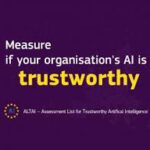The Assessment List for Trustworthy AI (ALTAI), developed by the European Commission’s High-Level Expert Group on AI (AI HLEG), is a key resource for ensuring the ethical use of AI. As the third output after the Ethics Guidelines for Trustworthy AI, ALTAI has been informed by an extensive pilot phase and reflects a broad consensus within the AI community.
ALTAI is designed to assist in the evaluation of AI systems across seven fundamental requirements: Human Agency and Oversight, Technical Robustness and Safety, Privacy and Data Governance, Transparency, Diversity Non-discrimination and Fairness, Societal and Environmental Well-being, and Accountability. This tool is essential for developers, implementers and users of AI in education to ensure that AI systems are ethically sound and trustworthy.
The ALTAI framework emphasises several key aspects:
- Human agency and oversight: AI systems should support human decision-making, respecting human autonomy and ensuring human oversight.
- Technical Robustness and Safety: This includes assessing AI systems for potential risks or threats, such as cyberattacks, and ensuring they are certified for cybersecurity.
- Privacy: AI systems must respect privacy and data protection rights, which are fundamental to personal integrity.
- Transparency: It is essential that AI systems are traceable, explainable and open about their limitations.
- Diversity, non-discrimination and fairness: AI must promote inclusion and diversity throughout its lifecycle.
- Social and environmental well-being: AI systems should consider broader societal and environmental impacts and stakeholders.
- Accountability :AI systems must have mechanisms in place to ensure accountability for their development, deployment and use.
In the educational context, adherence to these guidelines means that AI systems used in schools and other educational settings must be designed and implemented with a strong ethical foundation. This will ensure that they enhance, rather than undermine, educational goals. It includes a commitment to ongoing evaluation of these systems to ensure that they remain consistent with educational values and the well-being of all stakeholders. The effective implementation of ALTAI in educational settings will require ongoing collaboration between educators, technologists and policy makers to foster an environment where AI not only enhances learning, but also upholds ethical standards and societal values.
Read on to learn more: https://futurium.ec.europa.eu/en/european-ai-alliance/pages/welcome-altai-portal
